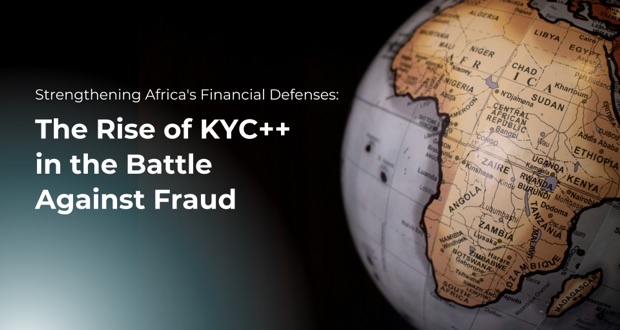In a recent revealing declaration, the EFCC Chairman disclosed that an astonishing 70% of financial crimes in Nigeria are intricately linked to the banking sector. Access Bank also recently admitted a N6.5 billion fraud loss in a single fiscal year in 2023, with 80% of the loss going to fraudulent transfers, withdrawals, and reactivation, and electronic fraud and USSD taking up the top three cause. It paints a grim picture of the challenges facing Africa's financial institutions today, and it leads to an urgent call for a more comprehensive identity check for financial institution to protect the digital financial environment.
Against this backdrop, the report revealed that Central Bank of Nigeria (CBN), the Nigerian Electronic Fraud Forum (NeFF), and the Association of Mobile Money and Banking Agents of Nigeria (AMMBAN) have been making collaborative effort to fight against financial fraud, particularly through the implementation of Know Your Customer (KYC) protocols at Point of Sale (PoS) terminals. This concerted effort marks a crucial step in the quest to bolster Africa's financial defenses.
“Fraudsters are evolving towards biometric fraud, with rates reaching a record-high 13% in Q4 2023.” - Disrupt Africa
The Escalating Threat of Financial Fraud
The rise of financial fraud poses a significant threat to Africa's financial sector, magnified by the continent's push for financial inclusion and digital advancement. This escalating challenge encompasses a range of fraudulent activities, from unauthorized transactions and document forgery to sophisticated biometric scams.
Transaction Fraud
In the financial landscape, transaction fraud primarily involves unauthorized access and use of bank accounts or cards to make purchases, withdraw funds, or transfer money illegitimately. It includes activities such as phishing (tricking individuals into revealing personal and banking information), installing malware on victims' devices to steal banking credentials, and card skimming (copying card information during transactions) to clone cards or conduct online transactions. This type of fraud is a significant concern for African financial institutions. The activities directly translates into substantial financial losses, eroding customer trust and confidence in financial institutions.
An increasing number of countries in Africa are facilitating financial inclusion by promoting the use of fintech solutions, such as mobile banking and money services. For example, Ghana implemented an interoperable system that allows for transactions between different telecommunications providers. This action has significantly propelled the expansion of mobile money. Previously, these providers could only act as agents for banks, but now they have the autonomy to manage mobile money accounts independently of traditional bank accounts. Never the less, it also brings expanded transactions risks like fraud and security breaches, necessitating advanced measures to protect users' financial data and transactions.
Document Fraud
Document fraud, including document forgery and the misuse of stolen ID, represents another critical concern within the financial sector. This type of fraud including using fake documents, altering document details such as portrait, expiry, signature, MRZ, etc., as well as exploiting someone else’s identity, to illicitly access financial services or conduct unauthorized transactions.
Official ID documents issued by the government play a crucial role in verifying identities. This is particularly true in the financial sector, where institutions are required to collect and verify these documents to ensure secure onboarding. Scammers looking to penetrate financial services often attempt to bypass these preliminary security measures by employing modified or unlawfully acquired documents — a primary instance of document fraud.
National ID is the most attacked document type in Africa, specifically in countries like Nigeria, South Africa, and Kenya. While in Ghana, SSNIT (National Insurance) and passport are more attacked than National ID.
Biometric Fraud
Biometric fraud poses a significant challenge as the continent rapidly adopts biometric verification methods for banking, election, and national identification systems. Biometric fraud involving the manipulation or replication of biometric data such as facial features and iris patterns. As technology evolves, the tactics to spoof or bypass the biometric test are getting more and more sophisticated - from using paper masks and 3D masks, to synthetic videos and digital hijacks - this type of fraud not only lead to great financial losses, but also threatens the integrity of these critical systems. In regions with less stringent security protocols or emerging technological infrastructure, fraudsters exploit vulnerabilities to create or alter biometric data, thereby gaining unauthorized access to services, personal data, and financial accounts.
With the shift of financial dealings and commercial activities to digital platforms, the necessity for accurate identity verification is crucial to curbing fraud and criminal undertakings.
The Crucial Role of KYC in Mitigating Fraud
Know Your Customer (KYC) is an essential regulatory and compliance process employed by businesses, predominantly within the financial sector, aimed at verifying the identity of their clients and understanding the nature of their activities. The process involves collecting and verifying personal identification data, such as name, date of birth, address, and government-issued identification numbers.
By ensuring that customers are who they claim to be, KYC helps in minimizing the risk of financial institutions being used as vehicles for money laundering, digital fraud, and other illicit activities. They enable institutions to detect suspicious activities early and take appropriate action to prevent potential fraud. This is increasingly important in a digital world where identity theft and cyber fraud are on the rise.
The financial industry in Africa experiences a 10% to 15% fraud rate throughout 2023. As more financial activities move online, KYC takes on added significance to the above fraud trends by ensuring that financial services are offered only to legitimate customers, thereby significantly reducing the risk of fraud.
KYC++: Elevating Fraud Prevention
KYC++ is an innovative global identity verification solution that integrates document verification, biometric authentication, and device checks in one process. It enhances traditional KYC procedures by employing advanced technology such as Optical Character Recognition (OCR), liveness detection, facial comparison, and device fingerprinting to optimizes identity verification. With the extra layer of defense examining the behavior patterns of user’s device, KYC++ creates a more comprehensive security framework to prevent document, biometric, and transaction fraud.
Document Verification
KYC++ introduces a sophisticated approach by utilizing Optical Character Recognition (OCR) technology as the first step to validate identification documents meticulously.
The procedure initiates with users being guided to capture an image of their document, ensuring it is properly positioned within a frame, clear, and fully visible for the analysis. The next phase evaluates critical aspects of the document's image, including potential glares, focus, resolution, the clarity of the portrait, boundaries, and perspective, to determine its quality. OCR then extracts data from both the text fields and the portrait on the document. The process culminates in a comprehensive cross-verification of the document's data, such as its type, expiry date, and all other relevant information, to affirm the ID's legitimacy.
Remarkably, KYC++ can accurately process over 12,500 types of identity documents from 247 countries and regions in 138 languages, covering most document types in Africa, such as National IDs, passports, driver’s licenses, voter cards, residence permits, refugee ID cards, health insurance cards, ECOWAS Id Cards, as well as other identity verification document. This feature is particularly beneficial for financial institutions engaged in overseas business.
Biometric Authentication
Biometric authentication aims to bolster security, enhance accuracy, and streamline processes in identity verification scenarios. By leveraging unique biological traits, such as facial features, it significantly reduces the risk of fraud and identity theft, providing a more reliable and tamper-proof method of authentication than traditional passwords or ID documents.
The biometric authentication in KYC++ is designed to detect liveness and compare the alignment of the portrait with the actual human being. There are three modes of liveness detection in KYC++: passive liveness detection, motion-based active detection, and flash liveness detection. Each mode is increasingly adept at detecting subtle, instantaneous facial reactions. Furthermore, KYC++ is capable of identifying if a user is employing impersonation and spoofing tactics, such as paper printout, 3D masks, deepfake videos, impersonation videos, and digital hijacks, with an OCR data recognition accuracy rate of over 95%, and 99% fraud attacks blocks.
Device Fingerprint
Relying solely on KYC for digital security isn't enough because it verifies only identity, not intent or behaviors. In contrast to traditional KYC verification, KYC++ enhances identity verification by incorporating device checks to spot any unusual behaviors linked to the user’s device. This approach collects and analyzes how a device interacts with a network or system. The data gathered creates a distinctive profile or "fingerprint" of the device, based on aspects like IP address, operating system, browser type and version, and any installed plugins and extensions.
By analyzing a device's behavior and comparing it to patterns of legitimate or fraudulent activities—such as devices with malicious tools or suspicious clicking behavior—device fingerprinting techniques can identify high-risk devices, alerting businesses with risk labels. This method identifies and combats various fraud types, including transaction fraud, identity theft, and payment fraud, adding a critical layer of defense by understanding not only the user's identity but also their device's typical behavior.
Challenges in KYC++ Adoption in Africa
Implementing KYC++ in African markets faces distinct challenges. Primarily, the diverse regulatory environments and the plethora of ID types—ranging from national IDs, passport, driver’s license, to SSNIT card and Bank Verification Numbers—require KYC++ to be highly adaptable for identity verification and compliant across various jurisdictions. Secondly, with over 350 million unbanked adults, many without formal IDs or digital access, KYC++ must bridge significant gaps to reach this population. Additionally, the variability in technological infrastructure and the critical need for data privacy and security further complicate KYC++ deployment. Addressing these challenges—regulatory diversity, the unbanked population, technological access, and data protection—demands concise, innovative strategies for successful KYC++ integration into Africa’s unique and diverse market landscape.
“KYC is the foundation of any platform. Once we have a digital ID system which is the KYC, all the African applications and platforms can roll out on it.” - Lacina Koné, CEO, Smart Africa
In A Nutshell
KYC++ is poised to significantly impact Africa's financial landscape, particularly by facilitating greater financial inclusion and supporting the burgeoning fintech ecosystem.
In the fight against digital financial fraud, KYC++ emerges as a formidable tool within Africa's evolving fintech landscape. By rigorously verifying the identities of users through advanced technologies like biometric authentication and device fingerprinting, KYC++ significantly enhances the security framework of digital financial transactions. This approach not only deters identity theft and fraudulent activities but also instills trust in digital finance platforms among users.
About TrustDecision
TrustDecision empowers digital businesses to make better decisions with decision intelligence solutions, including Artificial Intelligence (AI), Machine Learning (ML), Big Data and privacy-preserving computing. TrustDecision equips organizations with the tools they need to combat fraud, deliver comprehensive credit risk analytics and ensure compliance with regulations.
TrustDecision introduces KYC++ as the ultimate suite for businesses in banking, fintech, lending, and government to meet their identity verification needs. Learn more about the KYC++ solution at: https://trustdecision.com/solutions/kyc-plus














